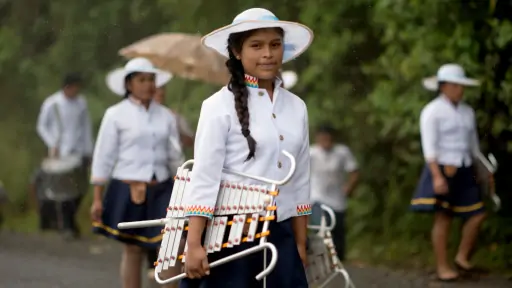Indigenous Calendar January, 2018: A Political Peace of the Prize

When last year's Nobel Peace Prize was awarded to the International Campaign to Abolish Nuclear Weapons, some saw it as a political decision. It was by no means the first time the award had acknowledged efforts aimed at nuclear disarmament. Yet it clearly echoed rising global concern over tension with North Korea.
As that tension mounted, so did international criticism of the Burmese military's treatment of that country's indigenous Rohingya people. It has been many years since Aung San Suu Kyi won the Nobel Peace Prize. The award helped her to rise, in her own words, "above the president." She may now be regretting those words. Last month the United Nations High Commissioner for Refugees suggested she could one day face the charge of genocide. If convicted she would join a very short list.
Almost half a million people have signed a petition calling for her Nobel Peace Prize to be revoked. That is slightly less than the number of Rohingya who have been forced to flee Burma (Myanmar) for Bangladesh just since last August. Although talks have taken place between the two countries aimed at repatriation beginning this month, the likelihood of that happening is small. Hatred of the Rohingya runs deep and is institutionalized in Burma. Given last month's arrest and charge of two Reuters journalists there, it seems that only reporting about the Rohingya can be as dangerous as being Rohingya. Suu Kyi's Freedom of Oxford award was revoked a few weeks ago; under present rules Nobel prizes cannot be revoked.
Perhaps more than at any other time in the history of the Nobel Institute, the world needs not just advocates, but implementers of peace. Nobel Peace Prizes have a history of controversy and last year's events only add to that history. We only know with certainty that there were 318 candidates for the 2017 Peace Prize. And that will be the case until 2067. But this did not stop speculation over who the likely candidates might have been. Almost all of that speculation was politically motivated.
In Panama, the Ngäbe people are no strangers to political struggle. A year ago I was in the Ngäbe-Bugle comarca in Panama. A marching band was parading through a village under heavy rain. This girl was among dozens of young musicians taking part. With the world the way it is, maybe that comarca will become the next place where peace is needed. Most Nobel prize winners are at least two generations older than this Ngäbe girl. She has plenty of time to collect her pieces of the prize.
If you enjoyed reading this article, please consider supporting independent, advertising-free journalism by buying us a coffee to help us cover the cost of hosting our web site. Please click on the link or scan the QR code. Thanks!


